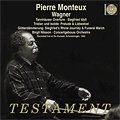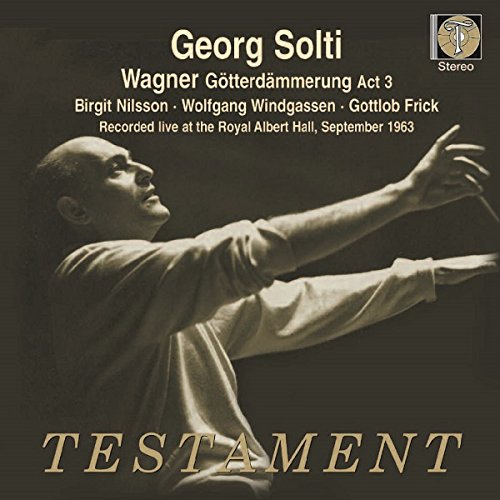WAGNER Götterdämmerung: Act 3/Monteux conducts Wagner
View record and artist detailsRecord and Artist Details
Composer or Director: Richard Wagner
Genre:
Opera
Label: Testament
Magazine Review Date: AW2015
Media Format: CD or Download
Media Runtime: 86
Mastering:
DDD
Catalogue Number: SBT2 1507

Tracks:
| Composition | Artist Credit |
|---|---|
| (Der) Ring des Nibelungen: Part 4, 'Götterdämmerung', Movement: orchestral interlude (Siegfried's Rhine Journey) |
Richard Wagner, Composer
Pierre Monteux, Conductor Richard Wagner, Composer Royal Concertgebouw Orchestra, Amsterdam (members of) |
| (Der) Ring des Nibelungen: Part 4, 'Götterdämmerung', Movement: Siegfried's funeral march |
Richard Wagner, Composer
Pierre Monteux, Conductor Richard Wagner, Composer Royal Concertgebouw Orchestra, Amsterdam (members of) |
| (Der) Ring des Nibelungen: Part 4, 'Götterdämmerung', Movement: Starke Scheite (Brünnhildes's Immolation) |
Richard Wagner, Composer
Birgit Nilsson, Soprano Pierre Monteux, Conductor Richard Wagner, Composer Royal Concertgebouw Orchestra, Amsterdam (members of) |
| Siegfried Idyll |
Richard Wagner, Composer
Pierre Monteux, Conductor Richard Wagner, Composer Royal Concertgebouw Orchestra, Amsterdam (members of) |
| Tannhäuser, Movement: Overture |
Richard Wagner, Composer
Pierre Monteux, Conductor Richard Wagner, Composer Royal Concertgebouw Orchestra, Amsterdam (members of) |
| Tristan und Isolde, Movement: Prelude and Liebestod (concert version: arr. Humpe |
Richard Wagner, Composer
Pierre Monteux, Conductor Richard Wagner, Composer Royal Concertgebouw Orchestra, Amsterdam (members of) |
Composer or Director: Richard Wagner
Genre:
Opera
Label: Testament
Magazine Review Date: AW2015
Media Format: CD or Download
Media Runtime: 75
Mastering:
ADD
Catalogue Number: SBT1506

Tracks:
| Composition | Artist Credit |
|---|---|
| (Der) Ring des Nibelungen: Part 4, 'Götterdämmerung', Movement: Act 3 |
Richard Wagner, Composer
Barbara Holt, Woglinde Birgit Nilsson, Brünnhilde, Soprano Georg Solti, Conductor Gottlob Frick, Hagen, Bass Gwyneth Jones, Wellgunde, Soprano Marie Collier, Gutrune, Soprano Maureen Guy, Flosshilde, Mezzo soprano Richard Wagner, Composer Royal Opera House Chorus, Covent Garden Royal Opera House Orchestra, Covent Garden Thomas Stewart, Gunther, Bass-baritone Wolfgang Windgassen, Siegfried, Tenor |
Author: Mike Ashman
Discover the world's largest classical music catalogue with Presto Music.

Gramophone Digital Club
- Digital Edition
- Digital Archive
- Reviews Database
- Full website access
From £8.75 / month
Subscribe
Gramophone Full Club
- Print Edition
- Digital Edition
- Digital Archive
- Reviews Database
- Full website access
From £11.00 / month
Subscribe
If you are a library, university or other organisation that would be interested in an institutional subscription to Gramophone please click here for further information.




